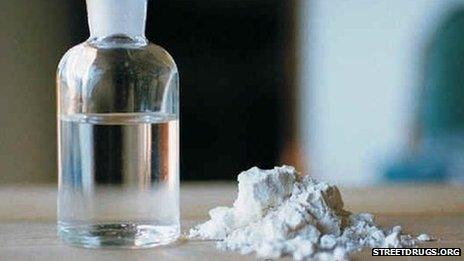'Legal high' hospital admissions increasing in Scotland
- Published

Legal highs are often sold as bath salts and plant food to avoid drug laws in the UK
Hundreds of people have been admitted to hospital across Scotland in the past five years after taking so-called legal highs, figures have revealed.
Last week, MSPs pledged to crack down on the availability of the substances.
Figures obtained by the Scottish Conservatives show there have been 323 hospital admissions since 2009, with cases doubling over the last two years.
However, only six health boards could supply numbers, so there is concern the real total could be much higher.
Substances sold as "legal highs" give similar effects to drugs such as ecstasy, but fall outside the government's misuse of drugs laws.
Last year, 139 admissions were recorded, compared with 61 in 2012. The total stayed below that number in the three previous years.
'Out of control'
Conservative health spokesman Jackson Carlaw, who obtained the figures from the Scottish government, said: "This is clearly a problem that is getting worse, and we need a plan of action to tackle it.
"Even from these statistics it's obvious the issue is becoming more prevalent.
"But, without all the health boards collecting the relevant data we will never know the true extent of it.
"Scotland already faces a major headache with alcohol and drugs, and we can't afford to let the problem of legal highs spiral out of control."
He added: "It's important both the Scottish government and the NHS are ahead of the game on this matter, to ensure these admissions figures can come down in future."
Community Safety Minister Roseanna Cunningham last week announced a summit will be held to try to crackdown on the sale and supply of the substances in Scotland.
Legal highs are often labelled and sold as plant food or bath salts, or marked as not fit for human consumption, as a tactic to avoid the law, the minister said.
They are easily accessible online, and, according to research, have also been found to be sold at petrol stations, newsagents and takeaways.
The UN and the EU recorded 73 new drugs in 2012, with 693 online shops selling legal highs across Europe in the same year.
Drug trends
A Scottish government spokeswoman said: "New psychoactive substances (NPS) can be extremely dangerous and it is impossible to know the contents and the dangers a drug may pose, whether it is legal or not.
"Recording the prevalence and use of NPS and the associated health harms is a challenge, which is being experienced internationally.
"Last week, the minister for community safety and legal affairs announced that the Scottish government would be commissioning research on NPS in Scotland to understand more about the scale of this issue and who is using these substances and why.
She added: "This builds on the work that we have been taking forward to improve national data collection tools to provide more information on the use of these substances
"National data is also supplemented by third sector organisations, such as support services and music festivals, who observe drug trends."
- Published21 December 2013
- Published4 June 2013
- Published26 June 2013
- Published17 April 2013